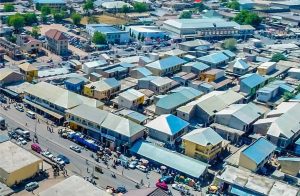
Gombe: Once a rural town, Gombe has witnessed changes since 1996 that it was carved out of the former Bauchi State and and made the capital of Gombe State, Nigeria. The town has a university, an airport and new roads and layouts across the town complemented with good drainage system. There are also street lights and new modern buildings in many parts of the town such as in Bauchi Road, Sabon Line and Jekada Fari roads. These areas, as well as the Terminus Roundabout, are some of the busiest areas in Gombe town. Gombe is a neat but quiet town. At night or in the day, the town presents a picture of a peaceful place, devoid of the noise and disorder of Onitsha and Lagos. Apart from taxi cabs that ply the routes, motorcyclists called achaba in Hausa language, is a popular means of transportation in the town.
Social Life
The peaceful nature of Gombe reflects in its social life. In terms of social life, Gombe is unexciting. There are few relaxation joints in the town, with food, drink and music on offer. And some of them are located within the ‘railway’ area which comprises the “Railway Club” as well as the “Safari Joint.” However, there’s a cinema club called Miyetti Cinema, where lovers of films, especially Indian films, go to unwind. For soccer lovers, Gombe United Football club, apart from the DSTV sport channels, provides a source of entertainment for residents of the town and adjoining communities especially during the weekends. Although Gombe might not boast of a vibrant social life, the different tribes in the state organise cultural festivals at different times of the year. Apart from the international hotel and stadium, new buildings and businesses have sprung up at a fast rate as the the agrarian town once considered as “a big village,” continue to develop into a modern city.

Geography
Located in the North-Eastern region of Nigeria- and home to over two million people – Gombe State boasts some of the most captivating hilly sights you could find anywhere in Nigeria. And this is better seen in the Filiya – Kushi-Burak-Bangunji areas of the state. The four communities and other adjoining ones are situated in a mountainous, rocky terrain that is both captivating and enchanting. Rugged, rocky and hilly, with many of the hills covered in green vegetation, this part of Gombe State, is yet one of the strongest proofs that Nigeria is highly gifted by nature. It is a tourist haven waiting to be tapped.
Ironically, the nature of the environment had posed a serious challenge, even to the point that it became a handicap to the people who lived there. Because of the rocky and rugged nature of the place, there had been no good network of roads linking the communities. Navigating the Filiya-Kushi-Burakn Bangunji road in a seemingly endless journey that finally led to the Lakwemi expressway, shortly after passing Bangunji, there is a mountainous forest with undulating hill which when climbed to its top, presents travelers with delightful sight of where the part of the road they come from. The road in many ways is said to qualify as Nigeria’s “ToraBora.” Tula is about 15 minutes drive from Lakwemi and less than one hour from Gombe town, the state capital. A trip to Tula from Lakwemi used to last as much as two hours given the perilous nature of the road, but that is no longer so, as the link-road to the two communities had since been constructed.
Tula
Tula is a small but historical town that is better known for its remand house called Tula Prisons. The prison was built in 1932, and once had as its inmates, Obafemi Awolowo. On navigating the snaky road to Tula, one comes across stone walls that serve as fortress. One of them stands as gate to the main entrance leading into the town. But Tula is not the only community in the state that boasts of a prison. Gombe also has its own. The Gombe prison was established in 1919, and although part of it was reconstructed in 1998, the prison still stands as one of the oldest structure in Gombe town. Gani Fawehinmi the fiery lawyer and human rights activist and Chris Anyanwu, a journalist, later a senator, are two popular Nigerians who at various times, served time at the prison during the military era[i].
[i] Newswatch, June 8, 2009





















